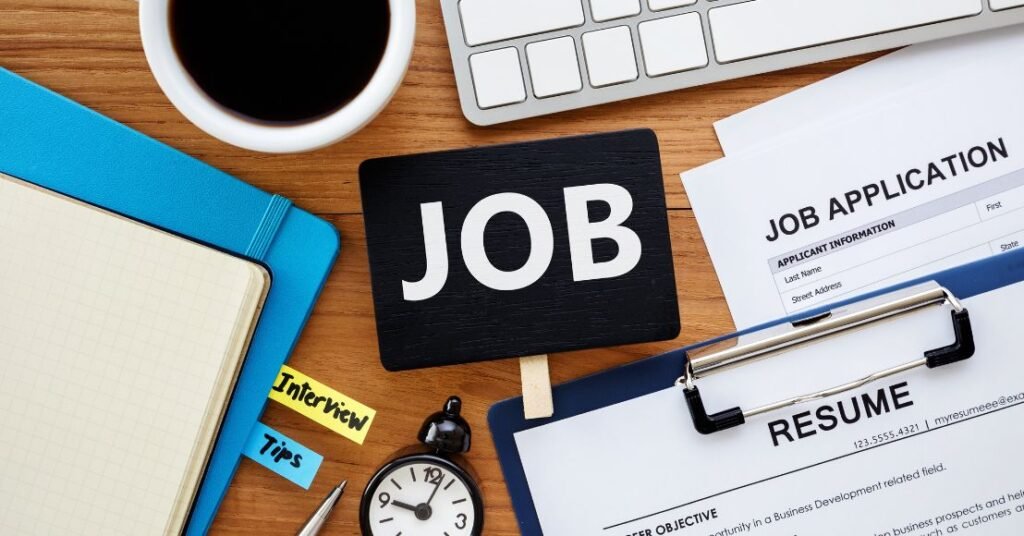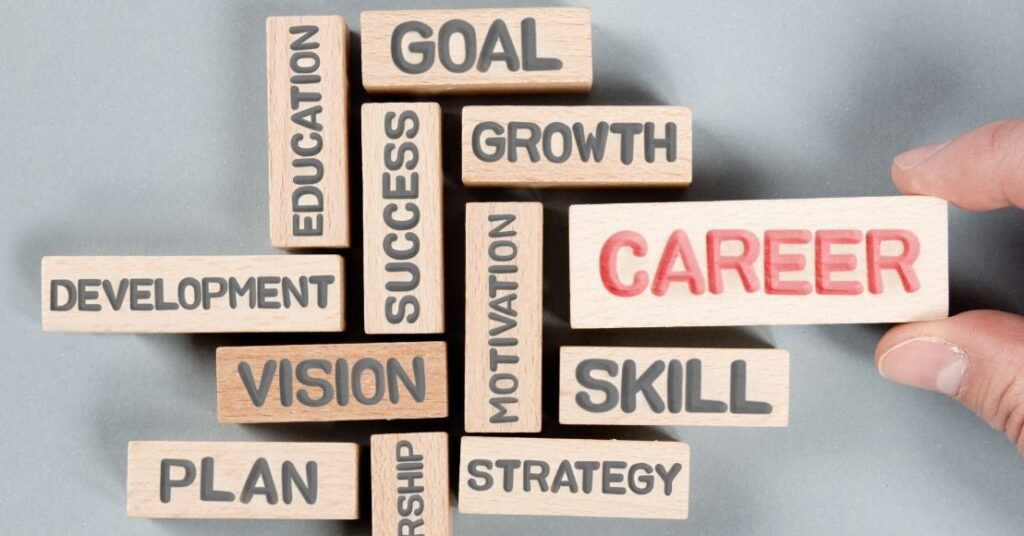A lot of people talk about work or a job to mean that they refer to the same things. They don’t. In reality, there’s an important distinction between having work and establishing a career. The understanding of this difference will change your perspective on the work you do, your progress, and your success.
In case you’ve wondered about the difference between them and what makes them different, this article can help you comprehend the job vs career distinction in simple terms.

What Is a Job?
An occupation is a job that you perform primarily to earn a living. It’s usually temporary and focuses on your immediate needs, instead of your long-term goals.
For instance, if you are employed at a store or a call center or even as a delivery driver to pay for your expenses, it’s work. You’re required to perform certain tasks that pay you a wage and then move on to find a better job.
An occupation doesn’t necessarily require dedication or passion for a long time. It’s more about the work that is happening in the present and what you do today, not the direction you intend to go in the near future.
In simple terms,
A job is the work you do to live.
What Is a Career?
The career is, on the contrary, a lengthy journey. It’s not all about earning money. It’s about the pursuit of passion, growth, and a sense of purpose.
A career encompasses every job, skill and experience that will allow you to advance within your field of choice. For instance, if you begin as a teacher trainee and then progress to lecturer, then become a principal, this is a career in education.
A successful career takes time, planning, effort, and preparation. It’s a part of your life that you can grow and is an integral part of who you are.
The definition of a profession is the way you work to be successful.

Job vs Career: The Real Difference
We need to make the career vs. job distinction clearer.
When you’re working, your primary goal is to make money or gain knowledge if you are employed. It is possible that you do not have a strong connection to your job or even see the long-term benefits.
If you’re working in a job where your work is in line with your goals for the long term. Your focus is on improving your abilities, learning about your career, and meeting goals that are important to you.

In the simplest form:
- Work is temporary and dependent on tasks.
- A profession is long-term and based on growth.
- A job gives you income.
- A profession provides you with an identity and fulfillment.
Why the Difference Matters
Knowing this distinction will help you decide on how to design your future.
If you only focus on your job, you might earn money, but you may feel trapped or unhappy later. When you develop your career, each job you do can be a way to get to greater things.
Consider it this way. Imagine it like this:
An occupation is a brick; however, a career is the whole structure. There are many tasks to develop your career, but your vision and direction are what make it a worthwhile experience.
The Role of Career Planning
Planning your career involves thinking about where you’d like to take your career and how you can reach it. It assists you in making smart decisions, regardless of whether you’re just beginning or have already started your career.
When you think about the direction of your future career, you will focus on:
- What you are passionate about.
- What are the skills you would like to build?
- What kind of work brings satisfaction to you?
- What would you like to be in five or ten years?
If they don’t plan their careers, they frequently jump from one job to another, without advancing. However, when you plan your career, each step will help you reach your desired goals.

Signs You Have a Job (Not a Career)
It’s easy to determine if you’re not doing your job. Here are some indicators:
- You are only paid for your salary.
- It’s not like you’re enthusiastic about your job.
- You’re not learning new techniques.
- Your job is only temporary.
- You’re not sure which direction it’s leading you.
If this is a familiar scenario, then you’re probably mostly focusing on the short-term requirements instead of long-term objectives. It’s fine — lots of people get jobs prior to figuring out their career route.
Signs You’re Building a Career
You’ll know you’re working toward a career path when:
- You are passionate about your job.
- You’re always looking to improve.
- You set goals for your future.
- You take pride in the work you do.
- There is always growth and learn in your journey.
A job gives you an idea of direction and fulfillment — something that goes beyond the current salary.
How to Turn a Job Into a Career
If you are feeling stuck in your job and are looking to create your career, here’s where to begin:
1. Discover What You Love
Take a look at what really interests you. What type of thing makes you satisfied or happy? Once you’ve identified your passion, it’s easy to determine your career path.
2. Set Goals
Create clear short-term and long-term goals. Think about what I want to have in the next five years? What skills will I need to be able to achieve that goal?
3. Keep Learning
Every job has something to study. Learn online, take part in seminars, or ask for new duties. Continuous learning is the key to career advancement.
4. Build a Network
Meet people from your field. Networking can help you discover fresh opportunities, mentors, and help.
5. Stay Consistent
It’s not easy to achieve success overnight. Be persistent in pursuing your goals, even if you feel like it’s slow. Each small step will bring you closer to your goal of achieving your dream job.
Job vs Career Mindset
Your mental attitude is the most significant difference.
People who have an attitude of work believe:
- “I just need to get through today.”
- “I’m here only for the money.”
People who have a professional mentality are influenced by:
- “How can I get better at what I do?”
- “This role will help me grow toward my dream.”
If you begin to think about the long-term, any job becomes an important aspect of your career.
Benefits of Having a Career Over a Job
The decision to make a successful career instead of working for a living has numerous advantages:
- Personal growth You continue to learn and get better.
- Higher Earnings : If you have experience and expertise, you can earn more.
- Job satisfaction : You are happy with your work and are satisfied with your job.
- Stability : A stable career can give you peace of mind and security for the long term.
- Recognition : People appreciate you for your skills and contributions.
Examples of Job vs Career
Here’s a quick example:
If you’re working part-time as a waiter in order to earn some money while you study, that’s work. If you begin as a waiter, then learn about food and management and later become a chef or restaurant manager, it’s the perfect profession in hospitality.
The job is not permanent. Careers are journeys.
Why Career Planning Is Important
The process of planning your future career can help you make informed choices. It helps you gain confidence, motivation, and direction. When you have a clear vision of your goals, you won’t have to switch between a variety of tasks.
It also allows you to handle problems better. Even if you switch job roles, your career direction is clear, as you know where you’re going.
Career planning is akin to using a map – it can help you get to your goal faster and more confidently.

Job vs Career: Which One Do You Have?
Answer these questions for yourself:
- Do I like my job?
- Have I learned something valuable?
- Do I envision myself doing something similar in the near future?
- Does my work help me to grow?
If the majority of your answers are “yes,” you’re building an opportunity to make a living. If you’re not, it’s time to begin planning a career.
There’s no time to wait until it’s too late to transition from one job to a profession. All you need is a clear vision and the desire to progress.
Conclusion
In the job vs. career discussion, the primary distinction lies in your motivation and your attitude. A job can help you earn money, while a career can help you create an entire life.
A job can pay your expenses, but a successful career provides you with satisfaction and growth as well as pride. The key to success is making a plan for your future by making goals, gaining knowledge continuously, as well as focusing your attention on the things that are important to you.
Don’t be a worker for money- make it a point to do so for a purpose. Create a path to a career that makes you feel happy and feel proud of your accomplishments.
FAQs
1. What is the most significant difference between the two?
A job is temporary and is focused on earning money, while a career is a longer-term experience that focuses on growth in both professional and personal life.
2. Does a job become a profession?
Yes, with the right education, the right way, being consistent and disciplined it is possible to transform any job into an enjoyable career.
3. What are career goals?
Career planning is about creating objectives for your future that are clear, identifying your strengths, and deciding on the best path to reach your goals.
4. What can I do to transition from one job to a profession?
Set goals for the future, as well as acquiring new skills and ensuring your work is aligned with what you’re most passionate about.
5. What makes a career more valuable than simply working?
A stable career can provide satisfaction, and a long-term track record of success. A job generally will only provide temporary earnings.








